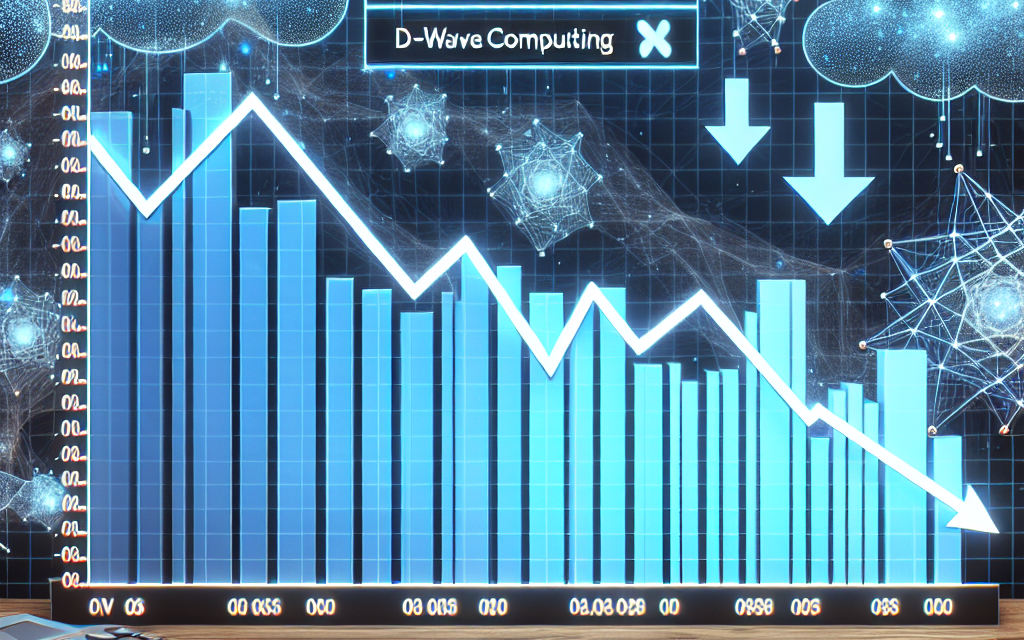“Market Shock: Quantum Computing Stocks Plunge Amidst Investor Concerns Over Industry Viability.”
Introduction
Today, shares of Rigetti Computing, Quantum Computing, and D-Wave Computing experienced significant declines, reflecting broader concerns in the quantum computing sector. Factors contributing to this downturn may include disappointing earnings reports, shifts in investor sentiment, increased competition, or regulatory challenges. As the market grapples with the viability and commercialization of quantum technologies, these developments have led to heightened volatility and uncertainty for companies operating in this emerging field.
Market Reactions to Quantum Computing News
In recent trading sessions, stocks associated with quantum computing, particularly Rigetti Computing, Quantum Computing Inc., and D-Wave Computing, experienced significant declines, prompting investors and analysts to scrutinize the underlying factors contributing to this downturn. The market’s reaction can be attributed to a confluence of events that have raised concerns about the future viability and growth potential of these companies within the rapidly evolving landscape of quantum technology.
To begin with, the broader economic environment has played a crucial role in shaping investor sentiment. As inflationary pressures persist and interest rates remain elevated, many investors are reassessing their portfolios, particularly in high-risk sectors such as technology. Quantum computing, while promising, is still in its nascent stages, and the uncertainty surrounding its commercialization makes it particularly vulnerable to market fluctuations. Consequently, as investors seek to mitigate risk, stocks in this sector have come under pressure, leading to a sell-off that has affected Rigetti, Quantum Computing Inc., and D-Wave.
Moreover, recent announcements from major tech companies regarding their advancements in quantum computing have further complicated the landscape. For instance, when industry giants unveil breakthroughs or partnerships that enhance their competitive edge, smaller players often find themselves overshadowed. This was evident when a leading tech firm disclosed a significant leap in quantum algorithm development, which not only highlighted its own capabilities but also raised questions about the market positioning of smaller companies like Rigetti and D-Wave. As a result, investors may have perceived these smaller firms as less competitive, prompting a reevaluation of their stock values.
In addition to competitive pressures, the financial performance of these companies has also come under scrutiny. Recent earnings reports revealed that some of these firms are struggling to achieve profitability, which is a critical concern for investors. The quantum computing sector requires substantial investment in research and development, and while the long-term potential is immense, the short-term financial metrics can be disheartening. When companies like Quantum Computing Inc. report wider-than-expected losses or lower-than-anticipated revenue growth, it can trigger a negative reaction in the stock market, leading to a decline in share prices.
Furthermore, regulatory uncertainties surrounding technology investments have added another layer of complexity. As governments around the world begin to formulate policies regarding emerging technologies, including quantum computing, the potential for increased regulation can create apprehension among investors. If companies face stricter compliance requirements or limitations on funding, the perceived risk associated with investing in quantum computing stocks may rise, prompting a sell-off.
Lastly, the overall sentiment in the tech sector has been influenced by macroeconomic indicators and geopolitical tensions. As global markets react to various economic signals, including employment data and trade relations, the tech sector often experiences heightened volatility. This broader market context can exacerbate the fluctuations seen in niche sectors like quantum computing, where investor confidence can shift rapidly based on external factors.
In conclusion, the recent plunge in stocks of Rigetti Computing, Quantum Computing Inc., and D-Wave Computing can be attributed to a combination of economic pressures, competitive dynamics, financial performance concerns, regulatory uncertainties, and broader market sentiment. As the quantum computing landscape continues to evolve, investors will need to navigate these complexities carefully, weighing the potential for innovation against the inherent risks associated with this cutting-edge technology.
Investor Sentiment and Quantum Stock Volatility
Investor sentiment plays a crucial role in the stock market, particularly in sectors characterized by rapid innovation and uncertainty, such as quantum computing. Recently, stocks of prominent companies in this field, including Rigetti Computing, Quantum Computing Inc., and D-Wave Computing, experienced significant declines. This downturn can be attributed to a confluence of factors that have collectively influenced investor confidence and market dynamics.
To begin with, the quantum computing sector is still in its nascent stages, characterized by high expectations and equally high volatility. Investors are often drawn to the potential of quantum technologies to revolutionize industries ranging from cryptography to pharmaceuticals. However, the inherent uncertainty surrounding the timeline for practical applications and profitability can lead to sharp fluctuations in stock prices. In this context, any negative news or broader market trends can trigger a swift sell-off, as seen with the recent plunge in these stocks.
Moreover, macroeconomic factors have also played a significant role in shaping investor sentiment. The current economic climate, marked by rising interest rates and inflationary pressures, has led to a more cautious approach among investors. In such an environment, speculative investments, including those in emerging technologies like quantum computing, often face heightened scrutiny. As investors reassess their portfolios, they may choose to divest from stocks perceived as high-risk, further exacerbating the volatility in this sector.
In addition to macroeconomic influences, company-specific developments can significantly impact investor sentiment. For instance, if a company announces delays in product development or fails to meet earnings expectations, it can lead to a rapid decline in stock prices. In the case of Rigetti Computing, Quantum Computing Inc., and D-Wave Computing, any recent announcements regarding technological setbacks or changes in strategic direction may have contributed to the negative sentiment surrounding their stocks. Such developments can create a ripple effect, as investors react not only to the news itself but also to the potential implications for the companies’ long-term viability.
Furthermore, the competitive landscape within the quantum computing industry adds another layer of complexity. As more players enter the market, the pressure to innovate and deliver results intensifies. This competition can lead to increased volatility, as companies strive to differentiate themselves and capture market share. If investors perceive that a particular company is falling behind its competitors, it can lead to a swift reassessment of its stock value. Consequently, the interconnected nature of these companies means that a decline in one can influence the perception of others, creating a broader trend of volatility across the sector.
In conclusion, the recent plunge in stocks of Rigetti Computing, Quantum Computing Inc., and D-Wave Computing underscores the intricate relationship between investor sentiment and market volatility in the quantum computing sector. As investors navigate the challenges posed by macroeconomic conditions, company-specific developments, and competitive pressures, the potential for rapid fluctuations in stock prices remains high. While the long-term prospects for quantum computing are promising, the path to realizing that potential is fraught with uncertainty. As such, investors must remain vigilant and informed, recognizing that the volatility inherent in this emerging field is likely to persist in the near term.
Analysis of Rigetti Computing’s Recent Performance
In recent trading sessions, Rigetti Computing has experienced a significant decline in its stock price, reflecting broader trends in the quantum computing sector. This downturn can be attributed to a confluence of factors that have raised concerns among investors regarding the company’s future prospects. To understand the implications of this performance, it is essential to analyze the underlying elements that have contributed to Rigetti’s recent struggles.
Firstly, the overall market sentiment surrounding technology stocks, particularly in the quantum computing space, has been increasingly cautious. Investors are grappling with the reality that while quantum computing holds immense potential, the path to commercialization remains fraught with challenges. Rigetti, like its peers, has been caught in this wave of skepticism, as the market reassesses the timelines for achieving practical applications of quantum technology. This reassessment has led to heightened volatility in stock prices, with Rigetti’s shares reflecting this uncertainty.
Moreover, Rigetti’s financial performance has come under scrutiny. Recent earnings reports revealed a slower-than-expected growth trajectory, which has raised alarms about the company’s ability to scale its operations effectively. Investors are particularly concerned about the sustainability of Rigetti’s revenue streams, especially in light of increasing competition from both established tech giants and emerging startups in the quantum computing arena. As a result, the market has reacted negatively, leading to a sell-off that has further exacerbated the decline in Rigetti’s stock price.
In addition to these financial concerns, there are broader industry dynamics at play that have impacted Rigetti’s standing. The quantum computing landscape is evolving rapidly, with significant advancements being made by competitors such as D-Wave and IBM. These companies have made substantial investments in research and development, positioning themselves as leaders in the field. Consequently, Rigetti faces the dual challenge of not only innovating but also differentiating itself in a crowded marketplace. The pressure to deliver groundbreaking technology while maintaining a competitive edge has intensified, contributing to investor anxiety.
Furthermore, regulatory and geopolitical factors have also influenced Rigetti’s performance. As governments around the world increasingly recognize the strategic importance of quantum computing, there is a growing emphasis on national security and technological sovereignty. This shift has led to a more complex regulatory environment, which could pose challenges for companies like Rigetti that operate on a global scale. Investors are wary of the potential implications of these developments, leading to a more cautious approach to investing in quantum computing stocks.
In light of these challenges, Rigetti’s management has been tasked with navigating a difficult landscape. The company must not only address its immediate financial concerns but also articulate a clear vision for its future in the quantum computing ecosystem. This includes demonstrating a commitment to innovation, forging strategic partnerships, and effectively communicating its value proposition to investors. As Rigetti seeks to regain investor confidence, it will be crucial for the company to provide transparency regarding its operational strategies and long-term goals.
In conclusion, Rigetti Computing’s recent stock performance is emblematic of the broader challenges facing the quantum computing industry. With a combination of market skepticism, financial pressures, competitive dynamics, and regulatory complexities, the company finds itself at a critical juncture. As investors continue to evaluate the potential of quantum technology, Rigetti’s ability to adapt and respond to these challenges will be pivotal in determining its future trajectory in the market.
D-Wave Computing’s Strategic Challenges
D-Wave Computing, a prominent player in the quantum computing landscape, has recently faced a series of strategic challenges that have contributed to its stock’s decline. As the quantum computing sector continues to evolve, companies like D-Wave must navigate a complex array of technological, market, and competitive pressures. One of the primary issues affecting D-Wave is its positioning within a rapidly changing industry. While the company has made significant strides in developing quantum annealing technology, it has struggled to clearly differentiate its offerings from those of its competitors. This lack of distinctiveness can lead to confusion among potential customers and investors, ultimately impacting the company’s market performance.
Moreover, D-Wave’s focus on quantum annealing, while innovative, has raised questions about its scalability and applicability compared to other quantum computing paradigms, such as gate-based quantum computing. As companies like Rigetti and IBM invest heavily in gate-based systems, D-Wave’s reliance on a different approach may limit its appeal to a broader audience. This divergence in technology not only complicates D-Wave’s competitive positioning but also raises concerns about its long-term viability in a market that is increasingly favoring versatile and scalable solutions.
In addition to technological challenges, D-Wave is also grappling with market dynamics that have shifted in recent months. The growing interest in quantum computing has led to an influx of new entrants into the field, intensifying competition. As more companies emerge with innovative solutions and substantial funding, D-Wave must work harder to maintain its market share. This competitive pressure can lead to increased marketing and research and development expenditures, which may strain the company’s financial resources. Consequently, investors may become wary of D-Wave’s ability to sustain its growth trajectory, further contributing to the decline in its stock price.
Furthermore, D-Wave’s strategic partnerships and collaborations have not always yielded the expected results. While the company has sought to align itself with various academic institutions and industry leaders, the outcomes of these partnerships have sometimes fallen short of expectations. For instance, collaborative projects that were anticipated to drive innovation and market adoption have faced delays or challenges, leading to skepticism about D-Wave’s ability to execute its strategic vision. This uncertainty can erode investor confidence, prompting a reevaluation of the company’s prospects.
Another critical factor influencing D-Wave’s stock performance is the broader economic environment. As interest rates rise and inflation concerns persist, investors are becoming increasingly cautious about technology stocks, particularly those in emerging sectors like quantum computing. In this context, D-Wave’s stock may be viewed as a higher-risk investment, leading to sell-offs as investors seek to mitigate potential losses. This shift in sentiment can create a feedback loop, where declining stock prices further exacerbate concerns about the company’s financial health and strategic direction.
In conclusion, D-Wave Computing’s recent stock plunge can be attributed to a confluence of strategic challenges, including its competitive positioning, market dynamics, partnership outcomes, and broader economic factors. As the quantum computing landscape continues to evolve, D-Wave must address these issues head-on to regain investor confidence and secure its place in an increasingly crowded market. The path forward will require not only technological innovation but also a clear articulation of its value proposition to potential customers and stakeholders. Only by navigating these complexities can D-Wave hope to reverse its fortunes and emerge as a leader in the quantum computing revolution.
The Impact of Economic Factors on Quantum Stocks
The recent plunge in the stock prices of quantum computing companies such as Rigetti Computing, Quantum Computing, and D-Wave Computing can be attributed to a confluence of economic factors that have created a challenging environment for technology stocks in general. As investors grapple with rising interest rates, inflationary pressures, and a shifting economic landscape, the implications for emerging technologies like quantum computing become increasingly pronounced.
To begin with, the broader economic context plays a significant role in shaping investor sentiment. The Federal Reserve’s ongoing efforts to combat inflation have led to a series of interest rate hikes, which have raised the cost of borrowing for companies across various sectors. This tightening of monetary policy has particularly affected high-growth industries, including quantum computing, where companies often rely on external funding to fuel their research and development initiatives. As the cost of capital rises, the attractiveness of investing in speculative technologies diminishes, prompting investors to reassess their portfolios and, in many cases, divest from stocks perceived as high-risk.
Moreover, inflation itself poses a dual challenge. On one hand, it erodes consumer purchasing power, which can dampen overall economic growth. On the other hand, it increases operational costs for companies, particularly those in the technology sector that depend on advanced materials and specialized talent. For quantum computing firms, which are still in the nascent stages of commercialization, the pressure to maintain profitability becomes even more acute in an inflationary environment. As a result, investors may become wary of the long-term viability of these companies, leading to a sell-off in their stocks.
In addition to these macroeconomic factors, the competitive landscape within the quantum computing sector is evolving rapidly. As established tech giants like IBM, Google, and Microsoft continue to invest heavily in quantum research, smaller firms may find it increasingly difficult to differentiate themselves and secure market share. This intensifying competition can create uncertainty regarding the future growth prospects of companies like Rigetti, Quantum Computing, and D-Wave. Consequently, investors may choose to pivot towards more established players with proven track records, further exacerbating the decline in stock prices for smaller firms.
Furthermore, the market’s reaction to earnings reports and technological advancements can also influence stock performance. If a quantum computing company fails to meet investor expectations or announces delays in product development, the repercussions can be swift and severe. In the current economic climate, where investors are particularly sensitive to any signs of weakness, even minor setbacks can trigger significant sell-offs. This phenomenon was evident in the recent downturn, as disappointing news from one company can create a ripple effect, impacting the entire sector.
In conclusion, the decline in the stock prices of Rigetti Computing, Quantum Computing, and D-Wave Computing is a reflection of the broader economic challenges facing the technology sector. Rising interest rates, inflationary pressures, and increased competition all contribute to a climate of uncertainty that weighs heavily on investor sentiment. As the quantum computing industry continues to evolve, it will be crucial for these companies to navigate these economic headwinds effectively. By demonstrating resilience and adaptability, they may yet regain investor confidence and chart a path toward sustainable growth in the future.
Comparing Quantum Computing Companies: A Financial Overview
In recent times, the quantum computing sector has garnered significant attention from investors and technology enthusiasts alike. However, the financial landscape for companies in this field can be volatile, as evidenced by the sharp decline in stock prices for Rigetti Computing, Quantum Computing, and D-Wave Computing observed today. To understand the implications of this downturn, it is essential to compare these companies and analyze the factors contributing to their financial performance.
Rigetti Computing, known for its focus on developing quantum processors and cloud-based quantum computing services, has been a prominent player in the industry. Despite its innovative technology and strategic partnerships, Rigetti has faced challenges in scaling its operations and achieving profitability. Investors have expressed concerns regarding the company’s ability to deliver on its ambitious growth targets, particularly in a market that is still in its infancy. As a result, the stock has experienced fluctuations, and today’s plunge can be attributed to a combination of market sentiment and broader economic factors affecting technology stocks.
Similarly, Quantum Computing, a company that has positioned itself as a leader in quantum software and algorithms, has also seen its stock take a hit. While the company has made strides in developing applications for quantum computing, the competitive landscape is intensifying. As more players enter the market, the pressure to innovate and differentiate becomes paramount. Investors are increasingly wary of companies that may struggle to maintain their competitive edge, leading to a sell-off in Quantum Computing’s shares. The recent downturn reflects a growing skepticism about the sustainability of its business model in a rapidly evolving sector.
D-Wave Computing, which has carved out a niche in quantum annealing technology, has similarly faced headwinds. Although D-Wave has established itself as a pioneer in the field, its reliance on a specific type of quantum computing has raised questions about its long-term viability. The company has made significant investments in research and development, but the path to commercialization remains fraught with uncertainty. As investors reassess the potential of various quantum computing approaches, D-Wave’s stock has been adversely affected, mirroring the trends seen in its competitors.
The collective decline in stock prices for these three companies can also be linked to broader market dynamics. The technology sector, in general, has been under pressure due to rising interest rates and inflationary concerns, prompting investors to reevaluate their portfolios. In this context, speculative investments, such as those in emerging technologies like quantum computing, are often the first to be scrutinized. As a result, the stocks of Rigetti, Quantum Computing, and D-Wave have become collateral damage in a market that is increasingly risk-averse.
Moreover, the lack of immediate, tangible results from quantum computing research and development can exacerbate investor anxiety. While the potential of quantum computing is immense, the timeline for practical applications remains uncertain. This uncertainty can lead to volatility in stock prices, as seen today. Investors are likely to remain cautious until there is clearer evidence of progress and profitability within the sector.
In conclusion, the recent plunge in the stock prices of Rigetti Computing, Quantum Computing, and D-Wave Computing underscores the challenges faced by companies in the quantum computing arena. As they navigate a complex landscape marked by competition, market pressures, and technological uncertainty, investors will be closely monitoring their performance and strategic decisions. The future of these companies will depend not only on their ability to innovate but also on their capacity to instill confidence in a market that is still coming to terms with the potential of quantum technology.
Future Outlook for Quantum Computing Investments
The recent plunge in the stock prices of quantum computing companies such as Rigetti Computing, Quantum Computing, and D-Wave Computing has raised significant concerns among investors and industry analysts alike. This downturn prompts a closer examination of the future outlook for quantum computing investments, particularly in light of the evolving technological landscape and market dynamics. As the field of quantum computing continues to mature, it is essential to consider both the potential and the challenges that lie ahead.
To begin with, the promise of quantum computing remains substantial. The technology has the potential to revolutionize various sectors, including pharmaceuticals, finance, and materials science, by solving complex problems that are currently intractable for classical computers. Companies like Rigetti, Quantum Computing, and D-Wave are at the forefront of this innovation, developing quantum processors and algorithms that could significantly enhance computational capabilities. However, despite the excitement surrounding these advancements, the path to widespread adoption is fraught with obstacles.
One of the primary challenges facing quantum computing investments is the significant capital required for research and development. The technology is still in its nascent stages, and substantial funding is necessary to advance quantum hardware and software. Investors must recognize that while the potential returns can be enormous, the timeline for achieving commercial viability is uncertain. This uncertainty can lead to volatility in stock prices, as seen in the recent market downturn.
Moreover, competition within the quantum computing sector is intensifying. Established tech giants such as IBM, Google, and Microsoft are heavily investing in their quantum initiatives, which could overshadow smaller players like Rigetti and D-Wave. As these larger companies continue to make strides in quantum research, they may capture a significant share of the market, leaving smaller firms struggling to compete. Consequently, investors must carefully assess the competitive landscape and consider how it may impact the long-term viability of their investments in quantum computing stocks.
In addition to competition, regulatory and ethical considerations are becoming increasingly relevant in the quantum computing space. As the technology develops, questions surrounding data privacy, security, and ethical use will likely come to the forefront. Investors should be aware that regulatory frameworks may evolve, potentially impacting the operations and profitability of quantum computing companies. This evolving landscape necessitates a proactive approach from investors, who must stay informed about regulatory developments and their implications for the industry.
Despite these challenges, there are reasons for cautious optimism regarding the future of quantum computing investments. The growing interest from both public and private sectors indicates a recognition of the technology’s transformative potential. Governments around the world are investing in quantum research initiatives, which could provide a supportive environment for innovation and growth. Furthermore, as quantum computing technology matures, it is expected that new applications will emerge, creating additional opportunities for investment.
In conclusion, while the recent decline in the stock prices of Rigetti Computing, Quantum Computing, and D-Wave Computing raises valid concerns, it is essential to maintain a balanced perspective on the future outlook for quantum computing investments. The potential for groundbreaking advancements in various industries remains strong, but investors must navigate a complex landscape characterized by competition, regulatory challenges, and the need for substantial capital. By staying informed and adopting a long-term investment strategy, stakeholders can position themselves to capitalize on the opportunities that quantum computing may present in the years to come.
Q&A
1. **Question:** What caused Rigetti Computing’s stock to plunge today?
**Answer:** Rigetti’s stock fell due to disappointing earnings reports and concerns over its financial stability.
2. **Question:** Why did Quantum Computing stocks experience a decline?
**Answer:** Quantum Computing stocks dropped following negative market sentiment and a lack of significant technological breakthroughs.
3. **Question:** What factors contributed to D-Wave Computing’s stock decline?
**Answer:** D-Wave’s stock fell due to investor concerns about competition and slower-than-expected adoption of quantum technologies.
4. **Question:** Were there any broader market trends affecting these stocks?
**Answer:** Yes, a general downturn in tech stocks and rising interest rates contributed to the decline in quantum computing stocks.
5. **Question:** Did any specific news events trigger the plunge in these stocks?
**Answer:** Yes, recent announcements regarding funding cuts in quantum research programs raised concerns about the industry’s future.
6. **Question:** How did investor sentiment play a role in the stock declines?
**Answer:** Investor sentiment turned negative due to fears of overvaluation and uncertainty about the timeline for practical quantum computing applications.
7. **Question:** Are there any long-term implications for these companies following today’s stock plunge?
**Answer:** Yes, the decline may lead to increased scrutiny on their business models and could impact future funding and partnerships in the quantum computing sector.
Conclusion
The decline in stocks for Rigetti Computing, Quantum Computing, and D-Wave Computing can be attributed to a combination of factors, including broader market trends affecting technology stocks, investor concerns over the pace of quantum computing advancements, and potential competitive pressures within the industry. Additionally, any negative news or earnings reports specific to these companies may have further contributed to the sell-off, leading to a loss of investor confidence in their growth prospects.





